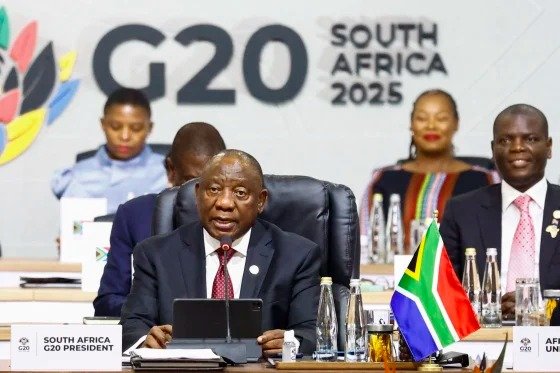The G20 leaders’ summit, held over Saturday and Sunday in Johannesburg, South Africa, concluded without the traditional ceremonial handover of the presidency to the United States, amid a sharp diplomatic dispute over the level of U.S. representation at the meeting.
The United States boycotted the two-day summit of leaders from advanced and emerging economies, citing claims by President Donald Trump’s administration that South Africa was allegedly mistreating its white Afrikaner minority—a charge strongly denied by Pretoria. Washington limited its representation to Chargé d’Affaires Mark Dillard, who attended the closing session to formally receive the G20 presidency.
South Africa condemned the U.S. decision to send only its chargé d’affaires, calling it an insult to President Cyril Ramaphosa, the host of the summit. South African Minister of International Relations and Cooperation, Ronald Lamola, stated on Sunday: “The United States is a member of the G20. If it wanted a representative, it could have sent someone at an appropriate level. This is a leaders’ summit, and the appropriate level would be a head of state, a special representative appointed by the president, or a minister.”
Lamola emphasized that the absence of high-level American participation prevented the traditional handover ceremony. He clarified that President Ramaphosa would not hand the presidency to the U.S. chargé d’affaires but would instead transfer it to the United States at a location or ministerial office designated within South Africa.
Despite Trump’s absence, Ramaphosa downplayed the issue, highlighting the G20’s role as a key platform for international cooperation. He remarked, “The G20 underscores the importance of multilateralism. The challenges we face can only be addressed through collaboration and partnership.”
The summit was also affected by other high-level absences, with Chinese Premier Li Qiang representing President Xi Jinping, Kremlin official Maxim Oreshkin standing in for President Vladimir Putin, and Argentine Foreign Minister Pablo Cerna attending instead of President Javier Milei.
The summit, the first ever held in Africa and the first in which the African Union participated as a permanent member, saw leaders warn of geopolitical divisions that could undermine the G20’s ability to address global economic crises. French President Emmanuel Macron remarked that “the G20 may be approaching the end of its relevance,” while UK Prime Minister Keir Starmer stressed the need to find “constructive ways to tackle global challenges.”
Despite the U.S. absence, the leaders adopted the summit declaration addressing climate, energy, debt, and strategic minerals. It also included calls for “just” peace in Ukraine, Sudan, the Democratic Republic of Congo, and the occupied Palestinian territories.
However, the U.S.-Africa disagreement cast a shadow over the event, particularly after Trump announced that the United States would host the next G20 summit in 2026 at his Florida golf club.

